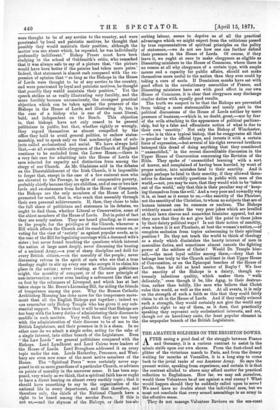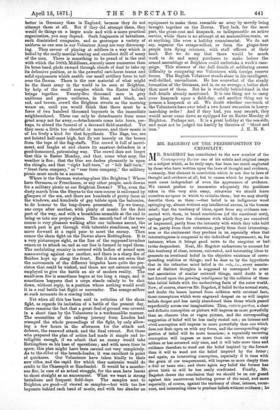THE AMATEUR SOLDIERS ON THE BRIGHTON DOWNS.
AFTER seeing a good deal of the struggle between France and Germany, it is a curious contrast to assist in the mimic strife upon our own shores. From the dust-cloud and glitter of the victorious march to Paris, and from the dreary waiting for months at Versailles, it is a long step to come back to the jovial ranks of our Amateur Army. So says the present writer, speaking from experience, and certain it is that the contrast alluded to above may afford matter for practical reflection to Englishmen. How far, we may ask purselves, would these Volunteers be of use against a real enemy ? What would happen should they be suddenly called upon to serve ? We need have no doubts about the individual men, but we must not conclude that every armed assemblage is an army in the effective sense.
They do not manage Volunteer Reviews on the sea-coast
better in Germany than in England, because they do not attempt them at all. But if they did attempt them, they would do things on a larger scale and with a more practical organization, you may depend. Such fragments of battalions, such diminished companies, and so grotesque a variety of uniform as one sees in our Volunteer Army are very discourag- ing. They savour of playing at soldiers in a way which is belied by the really martial bearing and excellent drill of many of the men. There is something to be proud of in the zeal with which the 500th Middlesex, scarcely more numerous than its brass band, plods onward through clouds of dust to take up its defensive position, or in the powerful cart-horse teams and solid equipments which enable our small artillery force to toil over the Downs. There is the raw material of what might be the finest army in the world to be seen at Brighton, by help of the small samples which the Easter holiday brings together. Twenty-five thousand men in grey uniforms and green uniforms, in blue, and black, and red, and brown, crowd the Brighton streets as the morning wears on, until you would think that there must be a force of two hundred thousand bayonets in the immediate neighbourhood. These can only be detachments from some great army not far away,—detachments come into town, per- haps, to attend the funeral of a deceased field-marshal. Yet they seem a little too cheerful in manner, and their music is of too lively a kind for that hypothesis. The flags, too, are not hoisted half-mast high, but fly out bravely on the breeze from the tops of the flag-staffs. The crowd is full of merri- ment, and laughs at and cheers its amateur defenders in a good-humoured, patronizing way. The crowd does not forget that this is Easter Monday, and that, come what may, the weather is fine ; that the blue sea dashes pleasantly in upon the shingle, and that "right half-turn," or "left half-turn," " front form company," or "rear form company," the military picnic must needs be a success.
Where is the German watering-place like Brighton ? Where have Germans, or Frenchmen, or any other people, such downs for a military picnic as our Brighton Downs ? Why, even the dusty march from the Steyne to the race-course is enlivened by glimpses of the sea, and there are hundreds of pretty faces at the windows, and hundreds of gay toilets upon the balconies, to do honour to the long-drawn procession. Up we tramp, one corps after another, with plenty of music for the first part of the way, and with a breathless scramble at the end to bring us into our proper places. The smooth turf of the race- course is very pleasant walking after our toilsome ascent, the march past is got through with tolerable steadiness, and we move forward at a rapid pace to meet the enemy. Then comes the sham fight on the Downs above Rottingdean. It is a very picturesque sight, as the line of the supposed invaders comes on to attack us, and as our line is formed to repel them. The undulating country is covered with bodies of armed men manoeuvring against one another, and there is a sharp fire of Sniders kept up along the front. But it does not seem that the movements of the different brigades have quite the pre- cision that could be wished, and there are not cannon enough employed to give the battle an air of modern reality. The small-arm fire is sometimes begun at too long a range, and it sometimes happens that a corps stands calmly to be shot down, without reply, in a position where nothing would avail it in a real battle but flight or surrender. The orange-sellers at such moments do a roaring trade.
Yet when all this has been said in criticism of the sham fight, as regards its imitation of a battle of the present day, there remains the fact that a great deal of ground was covered in a short time by the Volunteers in a workmanlike manner. The necessities of the railway journey from London had cramped the whole proceedings of the fight, by only allow- ing a few hours in the afternoon for the attack and defence, the renewed attack, and the final retreat. But those who prepared the plan of action had made it simple and in- telligible enough, if we admit that an enemy would take Rottingdean as his base of operations ; and with more time to spare, this plan might have been carried out very completely. As to the debut of the breech-loader, it was excellent in point of quickness. Our Volunteers have taken kindly to their new rifles, and the rapid fire which they maintain would do credit to the Chassepilt or Zundnadel. It would be a murder- ous fire, in case of an actual struggle, for the men have learnt to shoot straight as an amusement. What we want is strong battalions and frequent field-days. The samples sent to Brighton are good—if viewed as samples—but with too few bayonets behind each band of music, and with too slender an equipment to make them resemble an army by merely being brought together on the Downs. They lack, for the most part, the great-coat and knapsack, so indispensable on active service, while there is no attempt at an ammunition-train, or at anything like even a holiday commissariat. We do not say, organize the orange-sellers, or form the ginger-beer people into flying columns, with staff officers at their head. But we do say that there would be much work to do and many purchases to make before the armed assemblage at Brighton could undertake a week's cam- paign. This absence of the dull details of soldiering causes difficulty in comparing our Volunteers with foreign reserve forces. The English Volunteer stands alone in his intelligent, well-drilled, unreadiness. He has somewhat of the steady formation of the Germans, and is, on an average, a better shot than most of them. But he is woefully behind-hand in the dull details already mentioned. It is one thing not to carry your knapsack upon a field-day, and another thing not to possess a knapsack at all. We doubt whether one-tenth of the Volunteers have ever tried a two hours' excursion in heavy- marching order ! And if they had, you may remark, they would never come down so equipped for an Easter Monday at Brighton. Perhaps not. It is a great holiday at the sea-side, and must not be judged too hastily by theories of " blood and



































 Previous page
Previous page